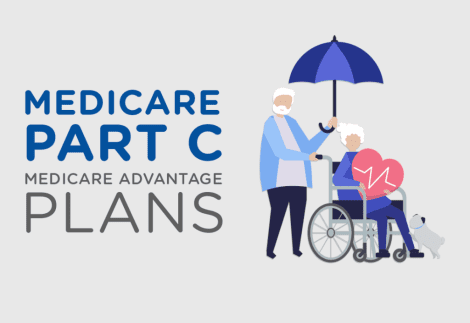
Medicare Advantage Plans, sometimes called “Part C” or “MA Plans,” are offered by Medicare-approved private companies that must follow rules set by Medicare. Most Medicare Advantage Plans include drug coverage (Part D). In many cases, you’ll need to use health care providers who participate in the plan’s network and service area for the lowest costs. These plans set a limit on what you’ll have to pay out-of-pocket each year for covered services, to help protect you from unexpected costs. Some plans offer out-of-network coverage, but sometimes at a higher cost. Remember, you must use the card from your Medicare Advantage Plan to get your Medicare-covered services. Keep your red, white, and blue Medicare card in a safe place because you’ll need it if you ever switch back to Original Medicare.
When you acquire Medicare Advantage, it takes over your Original Medicare and becomes your main coverage. Part C provides all Part A and B benefits. Many plans also include Part D drug coverage. However, the exact coverage you receive will vary by the provider you choose.
In this guide, we’ll take a closer look at Medicare Part C (also known as Medicare Advantage). We will outline how Part C works, what it covers, and what it costs. In addition, we will explain how Part C differs from other forms of Medicare.
What Does Medicare Part C Cover?
At a minimum, Part C must cover the same costs as Original Medicare (Parts A and B). In other words, an MA Plan must include all of the following:
- Part A
- Inpatient Hospital Care
- Hospice Care
- Nursing Home Care
- Home Health Care
- Part B
- Doctor’s Office Visits
- Ambulance Services
- Durable Medical Equipment (DME)
- Mental Health Care
- Outpatient Care
- Lab Tests and Bloodwork
- Preventative Care
The items above give an overview of Original Medicare and MA Plan benefits. For a more in-depth look at these benefits, check out our guides on Part A and Part B.
In addition to Original Medicare benefits, most HMOs and PPOs provide Part D drug coverage. Since you must acquire Part C through a private broker, you can customize the plan to meet your specific needs. For example, most programs allow you to add on dental, vision, and even gym benefits.
When To Enroll in Medicare Part C?
There are several periods during which you can sign up for a Medicare Advantage Plan. First, you are eligible to enroll during the Initial Enrollment Period. This period is the same for Parts A, B, C, and D. It begins on the first of the month, 3 months before the month of your 65th birthday.
The Initial Enrollment Period lasts for approximately 7 months, closing three months after the end of your birthday month. For example, if your birthday is on May 5th, your Initial Enrollment Period will begin on February 1st. It will continue for the three months leading up to your birthday, the month of your birthday, and then three additional months, closing on August 31st.
Agent Tip
Even if you miss your Initial Enrollment Period, you will still get the chance to sign up for Medicare Part C during the Open Enrollment Period, also known as the Annual Enrollment Period.
This period occurs every year, beginning on October 15th and ending on December 7th. During this time, you can sign up for Part C, enroll in a Medicare Advantage Plan, or switch between different types of Medicare.
Finally, if you meet specific requirements, you can qualify for a Special Enrollment Period (SEP). The SEP allows individuals in extenuating circumstances to sign up for Medicare coverage outside of the Initial Enrollment Period or Annual Enrollment without incurring any penalty fees.
Medicare Advantage vs. Medicare Supplement
With so many Medicare plans, many people feel confused about what they need or want. Moreover, the differences between Medicare Advantage (Part C) and Medicare Supplement (Medigap) are not always clear. After all, they are both non-mandatory plans offered by private insurers. While these two are related, they serve very different purposes. So, let’s take a closer look at the differences between Part C and Medigap:
Medicare Advantage (Part C)
Medicare Advantage Plans are another way to get your Medicare Part A and Part B coverage. Medicare Advantage Plans, sometimes called “Part C” or “MA Plans,” are offered by Medicare-approved private companies that must follow rules set by Medicare. Most Medicare Advantage Plans include drug coverage (Part D). In many cases, you’ll need to use health care providers who participate in the plan’s network and service area for the lowest costs. Finally, Part C allows beneficiaries to add on some optional benefits like vision or dental coverage.
Medicare Supplement (Medigap)
Medigap works as a supplement to Original Medicare. For example, Parts A and B don’t cover out-of-pocket costs like copayments and deductibles. With a Supplement Plan, you can fill in the missing gaps left by Original Medicare. Though Medigap is optional, it is an excellent way to save on some costs. Medigap beneficiaries will likely spend much less on high deductibles, copayments, and coinsurance.
Read More: What is Medicare Supplement Insurance?
Conclusion
You are not required to obtain a Part C policy. An MA Plan is just an alternative way to get Medicare benefits. Part C includes all of the same benefits as Parts A and B. Though private insurers provide it, Medicare Advantage must meet the standards set by Medicare. Finally, while Social Security can provide some info about Part C, you’ll need to contact a private insurance broker to buy a policy.
thumb
If you have questions about Medicare Part C or Medigap options, we’re here to help. Feel free to call us at (800) 208-4974 today!